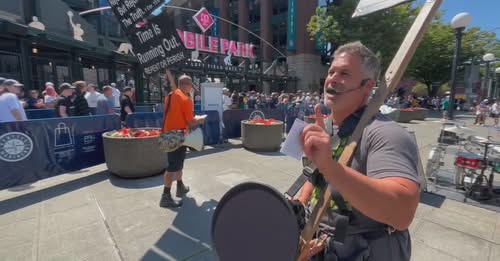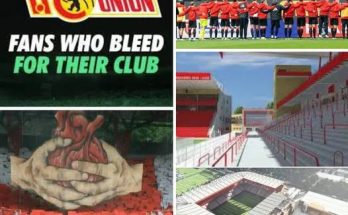Baseball fans are increasingly voicing their frustration over a growing and disruptive trend occurring just outside the gates of T-Mobile Park, home of the Seattle Mariners. While attending a ballgame is typically a cherished American pastime filled with anticipation, camaraderie, and celebration, fans in Seattle are finding that their journey into the stadium is being interrupted by a different kind of noise—amplified sermons blaring from megaphones wielded by street preachers. For many, this isn’t about a clash of beliefs but rather a conflict over public space, volume, and the right to enjoy a peaceful entry to a ballgame without being confronted with aggressive proselytizing.
The problem has gradually escalated over the last couple of seasons but has reached a boiling point in 2025. On game days, particularly during weekends or when the Mariners are hosting a marquee opponent, groups of street preachers line the sidewalks and pathways leading up to the stadium, particularly near the Left Field Gate and the Home Plate Entrance. Using portable loudspeakers and megaphones, they deliver fiery sermons about sin, repentance, and the coming judgment. While the content of their message has remained consistent with traditional evangelical rhetoric, it’s the tone, volume, and frequency of their presence that has sparked widespread irritation and calls for action.
Fans of all ages—from small children clutching baseball gloves to elderly season ticket holders—have reported feeling uncomfortable or even harassed by the confrontational nature of these preaching events. Parents trying to shield their kids from intense, sometimes graphic religious language are especially vocal. Many have shared stories of their children being scared or confused by what they’re hearing, including detailed depictions of hellfire, eternal damnation, and divine wrath. The joy of attending a Mariners game, often a family tradition passed down through generations, is being tainted by a form of public address that is, to many, both unwelcome and invasive.
It’s not just the fans who are concerned. Stadium staff, security personnel, and even local vendors have voiced their grievances about how the preaching disrupts the environment around the stadium. Hot dog stands and merchandise booths nearby have reported a decline in business due to the intimidating atmosphere created by the booming megaphones. Security officers are often placed in a difficult position. Legally, the preachers are standing on public sidewalks and not directly interfering with stadium operations, meaning their actions are largely protected by the First Amendment. But the sheer volume of the messages and the persistence with which they’re delivered, particularly through electronic amplification, are testing the limits of what many consider reasonable under the law.
This growing tension has led to petitions and formal complaints being filed by fans and advocacy groups who believe the city needs to intervene. A recent online petition calling for the restriction of megaphones and other amplification devices near T-Mobile Park gathered more than 40,000 signatures in just two weeks. Organizers argue that the issue is not one of religious freedom but one of public nuisance and emotional disturbance. Many point out that in any other setting—say a public park or outside a school—this level of amplified sound would likely trigger municipal noise ordinances. They wonder why a sports stadium, surrounded by excited fans simply looking to enjoy a game, should be any different.
Local lawmakers are now under increasing pressure to address the situation. Seattle City Councilmember Alex Hernandez recently acknowledged the complaints in a public forum, stating that the city was “actively reviewing current noise regulations and seeking legal counsel on what reasonable boundaries can be drawn that respect both constitutional rights and public peace.” Legal experts suggest that cities can, in fact, regulate the use of megaphones and amplification equipment in certain areas or during specific times, as long as such restrictions are content-neutral and do not target religious speech specifically. In short, it’s not about silencing anyone’s views but ensuring that the public space remains safe, welcoming, and enjoyable for all who use it.
Some preachers, however, argue that any effort to curb their presence or reduce the volume of their message is a direct attack on their freedom of expression. In interviews, several individuals have insisted that their mission is to save souls and that the location and timing—outside a stadium where thousands gather—offer a rare opportunity to reach the masses. They maintain that their method, while perhaps uncomfortable to some, is constitutionally protected and spiritually necessary. One preacher, who goes by Brother Daniel, said, “If we didn’t believe this was a matter of eternal life and death, we wouldn’t be out here. But we believe it is, and so we will keep coming.”
This impasse has resulted in a legal and cultural conundrum that many cities across the country are facing, but few have been able to resolve cleanly. The intersection of religious expression, free speech, and public order is delicate, and in Seattle, it’s become especially charged due to the frequency and intensity of the demonstrations outside Mariners games. The fact that the preachers return game after game, often with newer, louder sound systems and professionally printed signs, has led some to question whether the movement is part of a larger organized effort rather than a handful of isolated individuals.
In the midst of all this, fans are left to navigate a maze of high-decibel sermons and unsolicited judgment before they can enjoy nine innings of baseball. Many have resorted to wearing noise-canceling headphones or earbuds as they approach the stadium. Others walk faster, eyes downcast, hoping to avoid being singled out or engaged in a theological debate. Some have even started arriving earlier or later to avoid the peak preaching times, reshaping their entire game day routine around avoiding what they see as a persistent nuisance.
Seattle Mariners officials have largely stayed silent on the issue, though behind closed doors there is reportedly concern about how the situation affects the fan experience. While the team cannot legally dictate who can or cannot stand on city-owned sidewalks, there’s an understanding that public perception matters. If fans begin to associate the ballpark with discomfort, noise, and confrontation, the team’s image and bottom line could take a hit. Some insiders have even speculated that the Mariners might push for city zoning changes or lobby for temporary event-specific noise limitations, similar to those used during major festivals or parades.
For now, there seems to be no immediate resolution in sight. The street preachers show no sign of backing down, and the fans’ frustration continues to mount. As Seattle’s baseball faithful file through the turnstiles each week, many now brace themselves for more than just a tough divisional matchup—they’re preparing for a gauntlet of loud, fire-and-brimstone messaging delivered with unflinching intensity. Whether the city will be able to strike a balance between protecting free speech and preserving the sanctity of game day remains to be seen, but one thing is clear: the noise outside T-Mobile Park has become a flashpoint in the broader cultural conversation about where expression ends and harassment begins.
The experience of attending a baseball game, for most fans, is about more than just the sport. It’s about community, tradition, and escape—a chance to step away from the stresses of everyday life and reconnect with something joyful and rooted in shared experience. The intrusion of high-volume preaching into this space is seen by many not as a sign of moral conviction, but as a tone-deaf imposition on a cherished ritual. And while the debate over religious speech in public spaces is nothing new, the context of America’s ballparks—where unity is supposed to prevail over division—makes the issue all the more poignant.
Some longtime fans, particularly season ticket holders, have taken it upon themselves to document the activities of the preachers, filming interactions, recording sound levels, and submitting evidence to local authorities in the hopes of spurring regulatory action. Videos circulating on social media have shown moments of heightened tension, including fans yelling back, security getting involved, and even minor physical altercations when tempers flare. Though no major incidents have yet occurred, the emotional toll is becoming apparent. People are tired—not just of the sermons, but of the drama, the disruptions, and the sense that their voices, ironically, are not being heard.
Ultimately, the situation outside Mariners games has become emblematic of a broader national tension. It forces questions about how public spaces are shared, how differing values can coexist, and where the line lies between free speech and public disturbance. Until a policy shift occurs—or until one side decides to step back—the showdown outside T-Mobile Park will likely continue. And while the players on the field are locked in fierce competition inning after inning, fans are facing their own battle at the gates, where decibels clash with decorum and a simple day at the ballpark becomes a test of patience, tolerance, and civic will.



